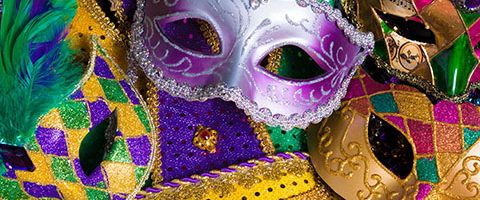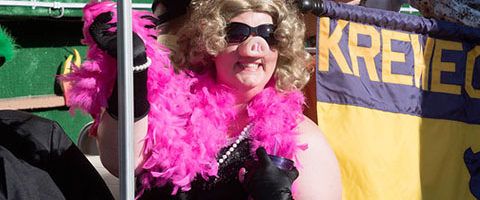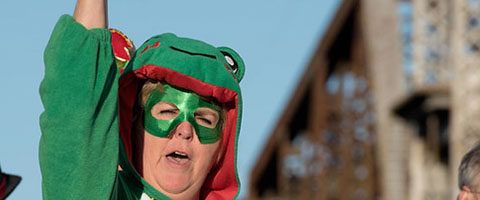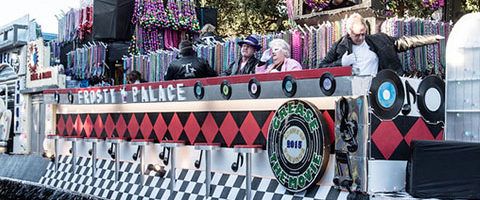BAL (Bal Masque, Tableau Bal) – A masked ball in which scenes representing a specific theme are acted out for the entertainment of club members and their guests, Krewe royalty is traditionally presented during the bal.
BOEUF GRAS (French)- The fatted bull or ox, the ancient symbol of the last meat eaten before the Lent season of fasting.
CALL OUT – The tradition of at the Bal of royalty or members of the Krewe publicly presenting favors to friends in order to honor them; traditionally used in conjunction with a call-out-dance where a Krewe member will present a favor to a lady friend who reciprocates by honoring him with a dance.
CAPTAIN – The absolute leader of a carnival organization.
CARNIVAL – From the latin “Carnivale“, loosely translated as “farewell to the flesh“; the season of merriment which begins on Twelfth Night (the feast of Epiphany), January 6, and ends at midnight on Fat Tuesday; the carnival season leads up to the penitential season of Lent in which fasting replaces feasting.
COURT – The king, queen, dukes, duchesses, prince and princesses of a carnival organization.
DEN – a large warehouse where floats are built and stored.
DOUBLOONS – aluminum coin like objects bearing the Krewe’s insignia on one side and a theme logo on the other side; first introduced in the 1960 Rex parade in New Orleans; doubloons are also minted and sold as souvenirs in silver, bronze and choisone versions.
FAVOR – a souvenir, given by Krewe members to friends attending the Bal, normally bearing the Krewe’s insignia, name and year of issue.
FLAMBEAUX (plural) – Naphtha-fueled torches, traditionally carried by white robed black men; in the 1900’s the flambeaux provided the only source of nighttime parade illumination.
INVITATION – A printed request for attendance at a Mardi Gras Bal; in the 19th century, many invitations were die cut and printed in Paris, France; invitations are non-transferable and it is improper to refer to them as tickets.
KING CAKE – an oval shaped, sugared pastry that contains a plastic doll hidden inside; the person who finds the doll is crowned king and buys the next cake or throws the next party.
KREWE – The generic term for a carnival organization; first used by the Mystic Krewe of Comus which coined the word in 1857 to give its club’s name an old English flavor.
MARDI GRAS – Also called “Fat Tuesday”, this is the last day of the Carnival season and the day before “Ash Wednesday” the first day of the season of “Lent”.
THROWS – inexpensive trinkets tossed from floats by costumed and masked Krewe members; among the more popular items are doubloons, plastic cups and plastic medallion necklaces.
TWELFTH NIGHT – The official beginning of the Mardi Gras Carnival season. Also known as the “Epiphany” (the day the wise men visited the baby Jesus). It is called twelfth night because it is always celebrated twelve days after Christmas, on January 6.




